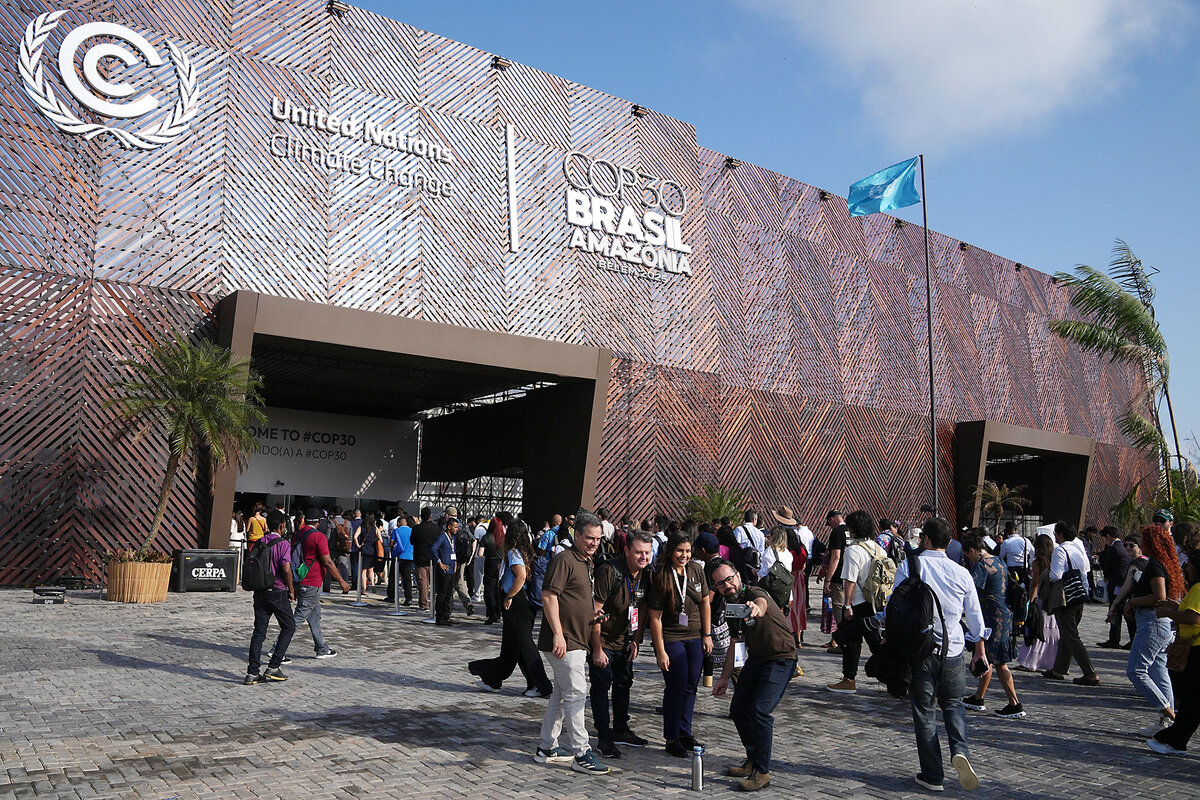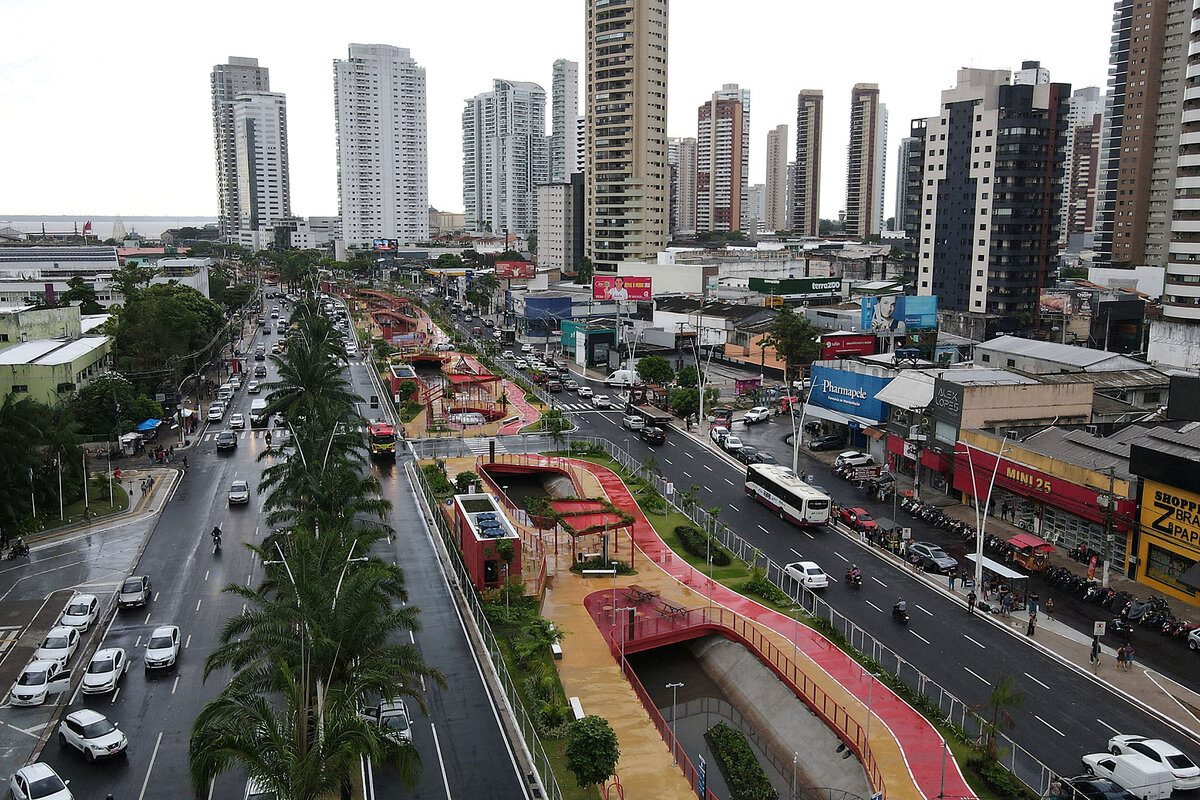Are climate conferences ‘too mega’? Activists and diplomats talk reform.
Loading...
| Rio de Janeiro
Tens of thousands of people – from diplomats to lobbyists to journalists – will soon convene on the edge of the Brazilian Amazon for the annual United Nations’ climate conference, COP30.
COP, short for Conference of the Parties, refers to signatories of the U.N. framework on climate change. It was first held in Berlin in 1995. The gatherings have led to key milestones in global efforts to combat climate change, like the 2015 Paris Agreement, which binds countries to make goals for lowering the amount of planet-warming greenhouse gases they put into the atmosphere.
But these annual environmental conferences are also full of contradictions.
Why We Wrote This
The United Nations’ climate conference, COP30, launches Nov. 10 in Belém, on the edge of Brazil’s Amazon. A growing chorus of voices is asking, Should it?
Autocratic petrostates have hosted the events the past two years, with oil executives as conference presidents. A trade fair on the sidelines of COP gatherings has mushroomed into an opportunity for corporations that critics say are some of the world’s worst polluters to lobby policymakers and attempt to show their “green” credentials. For instance, a leading generator of plastic waste, Coca-Cola, sponsored COP27 in Egypt.
There has been broad frustration among participants about the slow pace of negotiations and the lack of concrete results coming out of recent COP meetings. Meanwhile, many people concerned about the environment and looking in at these conferences from the outside question the logic of hosting the event in a different region every year. That requires participants to fly across the globe to discuss cutting carbon emissions, and in the case of Brazil this year, descend upon communities that aren’t prepared for their numbers.
Now, a growing chorus of voices – from leading climate diplomats to young activists – are calling for an overhaul of COP. And as Brazil has struggled to get the city of Belém ready for some 50,000 visitors from Nov. 10-21, the case for rethinking the event has only gained more attention.
Many negotiators are essentially saying “make COP boring again,” says Flávia Bellaguarda, co-founder of the Latin American Climate Lawyers Initiative for Mobilizing Action (LACLIMA). There’s a growing movement to slim down the number of participants and refocus on the core issue of how countries must address climate change.
Contradictions in an impoverished city
The Brazilian government chose Belém to host COP30 due to its location as a gateway to the Amazon, seeing it as an opportunity to show the world the rainforest that provokes global fascination and is a vital carbon sink. The sweltering port city of 1.3 million people, among the poorest state capitals in Brazil, also showcases the reality of climate injustice. The poorest and most marginalized populations are the least responsible for climate change, but often the most affected by it.
But in the rush to get Belém ready, climate justice appears to have fallen by the wayside. Tenants were evicted so landlords can cash in with short-term rentals. Basic sanitation to benefit a wealthy area meant dumping sewage and waste in a poor favela. Trees have been cut down to build a highway, disrupting livelihoods of communities that rely on the forest for work and sustenance.
“It’s anathema to everything the climate conference represents,” says Claudio Angelo, coordinator of international policies at the Climate Observatory, a coalition of environmental organizations in Brazil.
At the root of the problem is the sheer size of COP, which has ballooned in recent years. COP28 in Dubai two years ago had a record 85,000 accredited attendees, more than double the number in Paris in 2015. This year, over 55,000 participants are registered. Meanwhile, prior to the rush to prepare, Belém had around 18,000 hotel rooms.
Logistics weren’t such a problem when delegates numbered a few thousand and host countries picked locations with existing infrastructure, like holiday resorts or cities with U.N. headquarters.
“The feeling is that this has become too mega,” says Benito Müller, managing director of Oxford Climate Policy, a nonprofit working with climate negotiators, and co-author of a paper on how to revamp COP.
He suggests breaking up the proceedings: holding the negotiations in one place, the heads of state summit in another, and tacking what he calls the ‘expo’ – the national pavilions, the trade fair, and civil society events – on to another annual climate gathering, like the U.N.’s Framework Convention on Climate Change’s Regional Climate Weeks.
“We have so many distractions from the actual negotiations and knowledge sharing,” says Tobias Holle, a member of the Global Campaign to Demand Climate Justice (DCJ), who agrees COP needs to be slimmed down. The DCJ advocates reforms that include better guarantees for human rights for COP delegates and within host countries.
Mr. Angelo, meanwhile, believes that the conference “no longer needs to take place every year” as the focus shifts from countries negotiating agreements to implementing change at home.
Coming together for change
But COP is important, and reforms shouldn’t imply doing away with it, says Ms. Bellaguarda, who has attended the last seven COPs as a member of Brazilian civil society. There’s great value in civil society being present to pressure the negotiations, draw attention to the conference, and offer a diversity of perspectives and opinions, she says.
“It is much more efficient to get results if [everyone] meets in one place,” says Dr. Müller, in defense of COP.
Brazil has nodded to some of these issues – including concern with lack of progress and the local impact – giving assurances that the more than $1 billion it has invested in Belém will leave the city with lasting improvements. Brazil has promised to focus this COP on the implementation of the Paris Agreement.
Ultimately, observers like Mr. Angelo are concerned that logistical issues – leading to the absence of delegations due to scarce and expensive lodging – will end up overshadowing anything to come out of this year’s COP. That, in turn, could further raise the volume on calls for reform.








